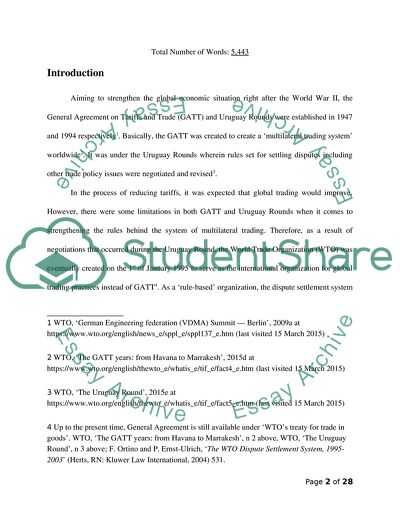
- Home
- Free Samples
- Premium Essays
- Editing Services
- Extra Tools
- Essay Writing Help
- About Us
- Studentshare
- Subjects
- Law
- The Jewel in the Crown System
The Jewel in the Crown System - Essay Example

- Subject: Law
- Type: Essay
- Level: Undergraduate
- Pages: 21 (5250 words)
- Downloads: 0
- Author: dallaszemlak
Extract of sample "The Jewel in the Crown System"
The World Trade Organization (WTO) was eventually created on the 1st of January 1995 to serve as the international organization for global trading practices instead of GATT4. As a ‘rule-based’ organization, the dispute settlement system of WTO sees to it that they make all important decisions based on a set of rules and continuous negotiation among its members5. To ensure a smooth flow in managing world trade issues, WTO purposely established its own ‘Dispute Settlement Body’ and ‘Trade Policy Review Body’6.
About WTO’s ‘Dispute Settlement Body’, this essay will focus on discussing why this particular system was once called “the Jewel in the Crown”. Using different past and current cases, the limitations of WTO’s ‘Dispute Settlement Body’ about settling international economic and political disputes will be discussed in detail. After conclusion, recommended strategies that could make it a better international dispute settlement system will be provided accordingly.
A few of the main reasons why WTO members would file for disputes are due to ‘broken promises’ or the violation of WTO’s trade rules and agreements7. As such, one of the possible reasons why the WTO dispute settlement system has been considered “the jewel in the crown” is because this particular system has been used as the framework for a peaceful, fast, effective, and reliable resolution of political and trade disputes8. As such, Shaffer and Melendez-Ortiz (2010, p. xi) added that its ability to serve as an ‘automatic dispute settlement procedure’ made it win the To effectively reduce the degree of ongoing dispute tension between two or more parties, the judicial body of WTO purposely created a list of rulings as they required all members to strictly follow certain “processes” and “procedures” when filing and settling a dispute complaint. WTO’s panel process aims to encourage all parties that will file a dispute complaint(s) to try to settle the case or any other concerned issues ‘out of court’. This explains why the first stage of the panel process is ‘consultation’.
...Download file to see next pages Read MoreCHECK THESE SAMPLES OF The Jewel in the Crown System
Preliminary Reference Procedure in Ensuring Uniformity and Consistent Development of European Union Law
Movers and Shakers in Education
The Strategies of Thoreau with King and Gandhi
Political cartoon Gay marriage Threat
Crisis of Confidence in the Poetry of the Twentieth Century
WTO as a Dispute Settlement Body
Imperialism, Individualism and the Great Game in Kim Novel
Tribulations of the Young African American Males on the Criminal Justice System

- TERMS & CONDITIONS
- PRIVACY POLICY
- COOKIES POLICY